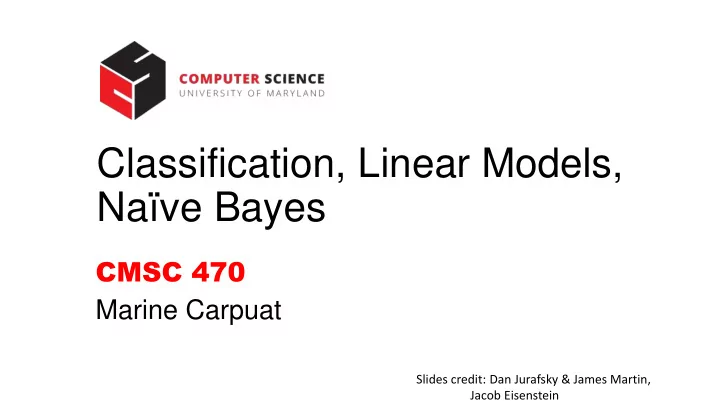

Classification, Linear Models, Naïve Bayes CMSC 470 Marine Carpuat Slides credit: Dan Jurafsky & James Martin, Jacob Eisenstein
Today • Text classification problems • and their evaluation • Linear classifiers • Features & Weights • Bag of words • Naïve Bayes
Classification problems
Multiclass Classification Training Testing training data unlabeled ? document label 1 label 2 label 3 label 4 Feature Functions label 1 ? label 2 ? supervised machine Classifier learning algorithm label 3 ? label 4 ?
Is this spam? From: "Fabian Starr“ <Patrick_Freeman@pamietaniepeerelu.pl> Subject: Hey! Sofware for the funny prices! Get the great discounts on popular software today for PC and Macintosh http://iiled.org/Cj4Lmx 70-90% Discounts from retail price!!! All sofware is instantly available to download - No Need Wait!
What is the subject of this article? MeSH Subject Category Hierarchy MEDLINE Article • Antogonists and Inhibitors • Blood Supply • Chemistry ? • Drug Therapy • Embryology • Epidemiology • …
Text Classification • Assigning subject categories, topics, or genres • Spam detection • Authorship identification • Age/gender identification • Language Identification • Sentiment analysis • …
Text Classification: definition • Input : • a document d • a fixed set of classes Y = { y 1 , y 2 ,…, y J } • Output : a predicted class y Y
Classification Methods: Supervised Machine Learning • Input • a document d • a fixed set of classes Y = { y 1 , y 2 ,…, y J } • a training set of m hand-labeled documents (d 1 ,y 1 ),....,(d m ,y m ) • Output • a learned classifier d y
Aside: getting examples for supervised learning • Human annotation • By experts or non-experts (crowdsourcing) • Found data • How do we know how good a classifier is? • Compare classifier predictions with human annotation • On held out test examples • Evaluation metrics: accuracy, precision, recall
The 2-by-2 contingency table correct not correct selected tp fp not selected fn tn
Precision and recall • Precision : % of selected items that are correct Recall : % of correct items that are selected correct not correct selected tp fp not selected fn tn
A combined measure: F • A combined measure that assesses the P/R tradeoff is F measure (weighted harmonic mean): b + PR 2 1 ( 1 ) = = F b + P R 1 1 2 a + - a ( 1 ) P R • People usually use balanced F1 measure i.e., with = 1 (that is, = ½): • F = 2 PR /( P + R )
Linear Models for Multiclass Classification
Linear Models for Classification Feature function representation Weights
Defining features: Bag of words
Defining features
Linear Classification
Linear Models for Classification Feature function representation Weights
How can we learn weights? • By hand • Probability • e.g.,Naïve Bayes • Discriminative training • e.g., perceptron, support vector machines
Naïve Bayes Models for Text Classification
Generative Story for Multinomial Naïve Bayes • A hypothetical stochastic process describing how training examples are generated
Prediction with Naïve Bayes Score(x,y) Definition of conditional probability Generative story assumptions This is a linear model!
Prediction with Naïve Bayes Score(x,y) Definition of conditional probability Generative story assumptions This is a linear model!
Prediction with Naïve Bayes Score(x,y) Definition of conditional probability Generative story assumptions This is a linear model!
Parameter Estimation • “count and normalize” • Parameters of a multinomial distribution • Relative frequency estimator • Formally: this is the maximum likelihood estimate • See CIML for derivation
Smoothing (add alpha)
Naïve Bayes recap
Why is this model called “Naïve Bayes”? Another view of the same model 𝑧 = 𝑏𝑠𝑛𝑏𝑦 𝑧 𝑄 𝑍 = 𝑧 𝑌 = 𝑦) = 𝑏𝑠𝑛𝑏𝑦 𝑧 𝑄(𝑍 = 𝑧)𝑄 𝑌 = 𝑦 𝑍 = 𝑧) 𝑒 = 𝑏𝑠𝑛𝑏𝑦 𝑧 𝑄(𝑍 = 𝑧) 𝑄 𝑌 𝑗 = 𝑦 𝑗 𝑍 = 𝑧) 𝑗=1 Bayes rule + Conditional independence assumption
Today • Text classification problems • and their evaluation • Linear classifiers • Features & Weights • Bag of words • Naïve Bayes
Recommend
More recommend